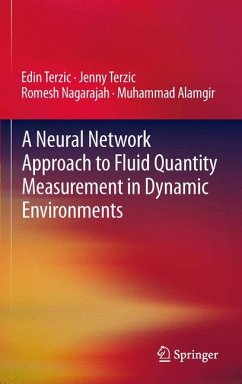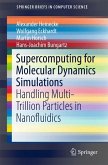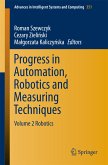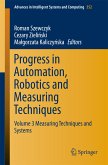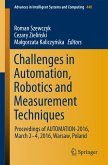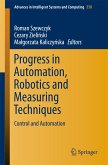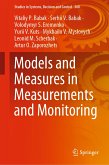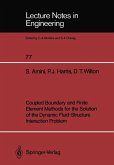A Neural Network Approach to Fluid Quantity Measurement in Dynamic Environments (eBook, PDF)


Alle Infos zum eBook verschenken

A Neural Network Approach to Fluid Quantity Measurement in Dynamic Environments (eBook, PDF)
- Format: PDF
- Merkliste
- Auf die Merkliste
- Bewerten Bewerten
- Teilen
- Produkt teilen
- Produkterinnerung
- Produkterinnerung

Hier können Sie sich einloggen

Bitte loggen Sie sich zunächst in Ihr Kundenkonto ein oder registrieren Sie sich bei bücher.de, um das eBook-Abo tolino select nutzen zu können.
Sloshing causes liquid to fluctuate, making accurate level readings difficult to obtain in dynamic environments. The measurement system described uses a single-tube capacitive sensor to obtain an instantaneous level reading of the fluid surface, thereby accurately determining the fluid quantity in the presence of slosh. A neural network based classification technique has been applied to predict the actual quantity of the fluid contained in a tank under sloshing conditions.
In A neural network approach to fluid quantity measurement in dynamic environments, effects of temperature variations…mehr
- Geräte: PC
- ohne Kopierschutz
- eBook Hilfe
- Größe: 7.28MB
![Supercomputing for Molecular Dynamics Simulations (eBook, PDF) Supercomputing for Molecular Dynamics Simulations (eBook, PDF)]() Alexander HeineckeSupercomputing for Molecular Dynamics Simulations (eBook, PDF)40,95 €
Alexander HeineckeSupercomputing for Molecular Dynamics Simulations (eBook, PDF)40,95 €![Progress in Automation, Robotics and Measuring Techniques (eBook, PDF) Progress in Automation, Robotics and Measuring Techniques (eBook, PDF)]() Progress in Automation, Robotics and Measuring Techniques (eBook, PDF)73,95 €
Progress in Automation, Robotics and Measuring Techniques (eBook, PDF)73,95 €![Progress in Automation, Robotics and Measuring Techniques (eBook, PDF) Progress in Automation, Robotics and Measuring Techniques (eBook, PDF)]() Progress in Automation, Robotics and Measuring Techniques (eBook, PDF)73,95 €
Progress in Automation, Robotics and Measuring Techniques (eBook, PDF)73,95 €![Challenges in Automation, Robotics and Measurement Techniques (eBook, PDF) Challenges in Automation, Robotics and Measurement Techniques (eBook, PDF)]() Challenges in Automation, Robotics and Measurement Techniques (eBook, PDF)161,95 €
Challenges in Automation, Robotics and Measurement Techniques (eBook, PDF)161,95 €![Progress in Automation, Robotics and Measuring Techniques (eBook, PDF) Progress in Automation, Robotics and Measuring Techniques (eBook, PDF)]() Progress in Automation, Robotics and Measuring Techniques (eBook, PDF)73,95 €
Progress in Automation, Robotics and Measuring Techniques (eBook, PDF)73,95 €- -29%11
![Models and Measures in Measurements and Monitoring (eBook, PDF) Models and Measures in Measurements and Monitoring (eBook, PDF)]() Vitaliy P. BabakModels and Measures in Measurements and Monitoring (eBook, PDF)129,95 €
Vitaliy P. BabakModels and Measures in Measurements and Monitoring (eBook, PDF)129,95 € ![Coupled Boundary and Finite Element Methods for the Solution of the Dynamic Fluid-Structure Interaction Problem (eBook, PDF) Coupled Boundary and Finite Element Methods for the Solution of the Dynamic Fluid-Structure Interaction Problem (eBook, PDF)]() Siamak AminiCoupled Boundary and Finite Element Methods for the Solution of the Dynamic Fluid-Structure Interaction Problem (eBook, PDF)73,95 €
Siamak AminiCoupled Boundary and Finite Element Methods for the Solution of the Dynamic Fluid-Structure Interaction Problem (eBook, PDF)73,95 €-
-
-
In A neural network approach to fluid quantity measurement in dynamic environments, effects of temperature variations and contamination on the capacitive sensor are discussed, and the authors propose that these effects can also be eliminated with the proposed neural network based classification system. To examine the performance of the classification system, many field trials were carried out on a running vehicle at various tank volume levels that range from 5 L to 50 L. The effectiveness of signal enhancement on the neural network based signal classification system is also investigated. Results obtained from the investigation are compared with traditionally used statistical averaging methods, and proves that the neural network based measurement system can produce highly accurate fluid quantity measurements in a dynamic environment. Although in this case a capacitive sensor was used to demonstrate measurement system this methodology is valid for all types of electronic sensors.
The approach demonstrated in A neural network approach to fluid quantity measurement in dynamic environments can be applied to a wide range of fluid quantity measurement applications in the automotive, naval and aviation industries to produce accurate fluid level readings. Students, lecturers, and experts will find the description of current research about accurate fluid level measurement in dynamic environments using neural network approach useful.
Dieser Download kann aus rechtlichen Gründen nur mit Rechnungsadresse in A, B, BG, CY, CZ, D, DK, EW, E, FIN, F, GR, HR, H, IRL, I, LT, L, LR, M, NL, PL, P, R, S, SLO, SK ausgeliefert werden.
- Produktdetails
- Verlag: Springer London
- Seitenzahl: 140
- Erscheinungstermin: 23. April 2012
- Englisch
- ISBN-13: 9781447140603
- Artikelnr.: 37339856
- Verlag: Springer London
- Seitenzahl: 140
- Erscheinungstermin: 23. April 2012
- Englisch
- ISBN-13: 9781447140603
- Artikelnr.: 37339856
- Herstellerkennzeichnung Die Herstellerinformationen sind derzeit nicht verfügbar.
Dr Jenny Terzic is the Senior Manager and RLE Business Leader at Ford Motor Company - Asia Pacific and Africa. She holds a Bachelor of Mechanical Engineering (with honors), Master of Engineering in Computer Integrated Manufacturing and PhD in Automotive Engineering from Swinburne University of Technology. She has published number of technical papers in the area of Engineering Applications of Artificial Intelligence. Areas of research include: support vector machines, artificial neural networks, advance signal processing, intelligent sensors and non-contact inspection.
Prof. Romesh Nagarajah is the Professor of Mechanical Engineering at Swinburne University of Technology. He leads an internationally recognized research group working in the fields of Non-Contact Inspection and Intelligent Sensing. Professor Nagarajah has several international patents and has published over 150 international journal, conference and technical papers in intelligent sensing and non-contact inspection. He has received several grants from the Australian Research Council and the automotive industry to develop intelligent sensing systems for process monitoring and non-contact inspection.
Muhammad Alamgir is a Software Engineer at Vipac Engineers & Scientists. He has graduated in Computer Systems Engineering from RMIT University. He has been developing microcontroller based sensors & instruments, and has also been involved in smart-sensor based projects, incorporating Artificial Intelligence based techniques, at Delphi Automotive Systems, Australia.
Prof. Romesh Nagarajah is the Professor of Mechanical Engineering at Swinburne University of Technology. He leads an internationally recognized research group working in the fields of Non-Contact Inspection and Intelligent Sensing. Professor Nagarajah has several international patents and has published over 150 international journal, conference and technical papers in intelligent sensing and non-contact inspection. He has received several grants from the Australian Research Council and the automotive industry to develop intelligent sensing systems for process monitoring and non-contact inspection.
Muhammad Alamgir is a Software Engineer at Vipac Engineers & Scientists.He has graduated in Computer Systems Engineering from RMIT University. He has been developing microcontroller based sensors & instruments, and has also been involved in smart-sensor based projects, incorporating Artificial Intelligence based techniques, at Delphi Automotive Systems, Australia.
Prof. Romesh Nagarajah is the Professor of Mechanical Engineering at Swinburne University of Technology. He leads an internationally recognized research group working in the fields of Non-Contact Inspection and Intelligent Sensing. Professor Nagarajah has several international patents and has published over 150 international journal, conference and technical papers in intelligent sensing and non-contact inspection. He has received several grants from the Australian Research Council and the automotive industry to develop intelligent sensing systems for process monitoring and non-contact inspection.
Muhammad Alamgir is a Software Engineer at Vipac Engineers & Scientists. He has graduated in Computer Systems Engineering from RMIT University. He has been developing microcontroller based sensors & instruments, and has also been involved in smart-sensor based projects, incorporating Artificial Intelligence based techniques, at Delphi Automotive Systems, Australia.
Prof. Romesh Nagarajah is the Professor of Mechanical Engineering at Swinburne University of Technology. He leads an internationally recognized research group working in the fields of Non-Contact Inspection and Intelligent Sensing. Professor Nagarajah has several international patents and has published over 150 international journal, conference and technical papers in intelligent sensing and non-contactinspection. He has received several grants from the Australian Research Council and the automotive industry to develop intelligent sensing systems for process monitoring and non-contact inspection.
Muhammad Alamgir is a Software Engineer at Vipac Engineers & Scientists. He has graduated in Computer Systems Engineering from RMIT University. He has been developing microcontroller based sensors & instruments, and has also been involved in smart-sensor based projects, incorporating Artificial Intelligence based techniques, at Delphi Automotive Systems, Australia.
Prof. Romesh Nagarajah is the Professor of Mechanical Engineering at Swinburne University of Technology. He leads an internationally recognized research group working in the fields of Non-Contact Inspection and Intelligent Sensing. Professor Nagarajah has several international patents and has published over 150 international journal, conference and technical papers in intelligent sensing and non-contact inspection. He has received several grants from the Australian Research Council and the automotive industry to develop intelligent sensing systems for process monitoring and non-contact inspection.
Muhammad Alamgir is a Software Engineer at Vipac Engineers & Scientists. He has graduated in Computer Systems Engineering from RMIT University. He has been developing microcontroller based sensors & instruments, and has also been involved in smart-sensor based projects, incorporating Artificial Intelligence based techniques, at Delphi Automotive Systems, Australia.
Dr Jenny Terzic is the Senior Manager and RLE Business Leader at Ford Motor Company - Asia Pacific and Africa. She holds a Bachelor of Mechanical Engineering (with honors), Master of Engineering in Computer Integrated Manufacturing and PhD in Automotive Engineering from Swinburne University of Technology. She has published number of technical papers in the area of Engineering Applications of Artificial Intelligence. Areas of research include: support vector machines, artificial neural networks, advance signal processing, intelligent sensors and non-contact inspection.
Prof. Romesh Nagarajah is the Professor of Mechanical Engineering at Swinburne University of Technology. He leads an internationally recognized research group working in the fields of Non-Contact Inspection and Intelligent Sensing. Professor Nagarajah has several international patents and has published over 150 international journal, conference and technical papers in intelligent sensing and non-contact inspection. He has received several grants from the Australian Research Council and the automotive industry to develop intelligent sensing systems for process monitoring and non-contact inspection.
Muhammad Alamgir is a Software Engineer at Vipac Engineers & Scientists. He has graduated in Computer Systems Engineering from RMIT University. He has been developing microcontroller based sensors & instruments, and has also been involved in smart-sensor based projects, incorporatingArtificial Intelligence based techniques, at Delphi Automotive Systems, Australia.
Prof. Romesh Nagarajah is the Professor of Mechanical Engineering at Swinburne University of Technology. He leads an internationally recognized research group working in the fields of Non-Contact Inspection and Intelligent Sensing. Professor Nagarajah has several international patents and has published over 150 international journal, conference and technical papers in intelligent sensing and non-contact inspection. He has received several grants from the Australian Research Council and the automotive industry to develop intelligent sensing systems for process monitoring and non-contact inspection.
Muhammad Alamgir is a Software Engineer at Vipac Engineers & Scientists. He has graduated in Computer Systems Engineering from RMIT University. He has been developing microcontroller based sensors & instruments, and has also been involved in smart-sensor based projects, incorporating Artificial Intelligence based techniques, at Delphi Automotive Systems, Australia.
Prof. Romesh Nagarajah is the Professor of Mechanical Engineering at Swinburne University of Technology. He leads an internationally recognized research group working in the fields of Non-Contact Inspection and Intelligent Sensing. Professor Nagarajah has several international patents and has published over 150 international journal, conference and technical papers in intelligent sensing and non-contact inspection. He has received several grants from the Australian Research Council and the automotive industry to develop intelligent sensing systems for process monitoring and non-contact inspection.
Muhammad Alamgir is a Software Engineer at Vipac Engineers & Scientists. He has graduated in Computer Systems Engineering from RMIT University. He has been developing microcontroller based sensors & instruments, and has also been involved in smart-sensor based projects, incorporating Artificial Intelligence based techniques, at Delphi Automotive Systems, Australia.
Prof. Romesh Nagarajah is the Professor of Mechanical Engineering at Swinburne University of Technology. He leads an internationally recognized research group working in the fields of Non-Contact Inspection and Intelligent Sensing. Professor Nagarajah has several international patents and has published over 150 international journal, conference and technical papers in intelligent sensing and non-contact inspection. He has received several grants from the Australian Research Council and the automotive industry to develop intelligent sensing systems for process monitoring and non-contact inspection.
Muhammad Alamgir is a Software Engineer at Vipac Engineers & Scientists. He has graduated in Computer Systems Engineering from RMIT University. He has been developing microcontroller based sensors & instruments, and has also been involved in smart-sensor based projects, incorporating Artificial Intelligence based techniques, at Delphi Automotive Systems, Australia.
Dr Jenny Terzic is the Senior Manager and RLE Business Leader at Ford Motor Company - Asia Pacific and Africa. She holds a Bachelor of Mechanical Engineering (with honors), Master of Engineering inComputer Integrated Manufacturing and PhD in Automotive Engineering from Swinburne University of Technology. She has published number of technical papers in the area of Engineering Applications of Artificial Intelligence. Areas of research include: support vector machines, artificial neural networks, advance signal processing, intelligent sensors and non-contact inspection.
Prof. Romesh Nagarajah is the Professor of Mechanical Engineering at Swinburne University of Technology. He leads an internationally recognized research group working in the fields of Non-Contact Inspection and Intelligent Sensing. Professor Nagarajah has several international patents and has published over 150 international journal, conference and technical papers in intelligent sensing and non-contact inspection. He has received several grants from the Australian Research Council and the automotive industry to develop intelligent sensing systems for process monitoring and non-contact inspection.
Muhammad Alamgir is a Software Engineer at Vipac Engineers & Scientists. He has graduated in Computer Systems Engineering from RMIT University. He has been developing microcontroller based sensors & instruments, and has also been involved in smart-sensor based projects, incorporating Artificial Intelligence based techniques, at Delphi Automotive Systems, Australia.
Prof. Romesh Nagarajah is the Professor of Mechanical Engineering at Swinburne University of Technology. He leads an internationally recognized researchgroup working in the fields of Non-Contact Inspection and Intelligent Sensing. Professor Nagarajah has several international patents and has published over 150 international journal, conference and technical papers in intelligent sensing and non-contact inspection. He has received several grants from the Australian Research Council and the automotive industry to develop intelligent sensing systems for process monitoring and non-contact inspection.
Muhammad Alamgir is a Software Engineer at Vipac Engineers & Scientists. He has graduated in Computer Systems Engineering from RMIT University. He has been developing microcontroller based sensors & instruments, and has also been involved in smart-sensor based projects, incorporating Artificial Intelligence based techniques, at Delphi Automotive Systems, Australia.
Prof. Romesh Nagarajah is the Professor of Mechanical Engineering at Swinburne University of Technology. He leads an internationally recognized research group working in the fields of Non-Contact Inspection and Intelligent Sensing. Professor Nagarajah has several international patents and has published over 150 international journal, conference and technical papers in intelligent sensing and non-contact inspection. He has received several grants from the Australian Research Council and the automotive industry to develop intelligent sensing systems for process monitoring and non-contact inspection.
Muhammad Alamgir is a Software Engineer at Vipac Engineers & Scientists. He has graduated in Computer Systems Engineering from RMIT University. He has been developing microcontroller based sensors & instruments, and has also been involved in smart-sensor basedprojects, incorporating Artificial Intelligence based techniques, at Delphi Automotive Systems, Australia.
Prof. Romesh Nagarajah is the Professor of Mechanical Engineering at Swinburne University of Technology. He leads an internationally recognized research group working in the fields of Non-Contact Inspection and Intelligent Sensing. Professor Nagarajah has several international patents and has published over 150 international journal, conference and technical papers in intelligent sensing and non-contact inspection. He has received several grants from the Australian Research Council and the automotive industry to develop intelligent sensing systems for process monitoring and non-contact inspection.
Muhammad Alamgir is a Software Engineer at Vipac Engineers & Scientists. He has graduated in Computer Systems Engineering from RMIT University. He has been developing microcontroller based sensors & instruments, and has also been involved in smart-sensor based projects, incorporating Artificial Intelligence based techniques, at Delphi Automotive Systems, Australia.
Prof. Romesh Nagarajah is the Professor of Mechanical Engineering at Swinburne University of Technology. He leads an internationally recognized research group working in the fields of Non-Contact Inspection and Intelligent Sensing. Professor Nagarajah has several international patents and has published over 150 international journal, conference and technical papers in intelligent sensing and non-contact inspection. He has received several grants from the Australian Research Council and the automotive industry to develop intelligent sensing systems for process monitoringand non-contact inspection.
Muhammad Alamgir is a Software Engineer at Vipac Engineers & Scientists. He has graduated in Computer Systems Engineering from RMIT University. He has been developing microcontroller based sensors & instruments, and has also been involved in smart-sensor based projects, incorporating Artificial Intelligence based techniques, at Delphi Automotive Systems, Australia.
Prof. Romesh Nagarajah is the Professor of Mechanical Engineering at Swinburne University of Technology. He leads an internationally recognized research group working in the fields of Non-Contact Inspection and Intelligent Sensing. Professor Nagarajah has several international patents and has published over 150 international journal, conference and technical papers in intelligent sensing and non-contact inspection. He has received several grants from the Australian Research Council and the automotive industry to develop intelligent sensing systems for process monitoring and non-contact inspection.
Muhammad Alamgir is a Software Engineer at Vipac Engineers & Scientists. He has graduated in Computer Systems Engineering from RMIT University. He has been developing microcontroller based sensors & instruments, and has also been involved in smart-sensor based projects, incorporating Artificial Intelligence based techniques, at Delphi Automotive Systems, Australia.
Prof. Romesh Nagarajah is the Professor of Mechanical Engineering at Swinburne University of Technology. He leads an internationally recognized research group working in the fields of Non-Contact Inspection and Intelligent Sensing. ProfessorNagarajah has several international patents and has published over 150 international journal, conference and technical papers in intelligent sensing and non-contact inspection. He has received several grants from the Australian Research Council and the automotive industry to develop intelligent sensing systems for process monitoring and non-contact inspection.
Muhammad Alamgir is a Software Engineer at Vipac Engineers & Scientists. He has graduated in Computer Systems Engineering from RMIT University. He has been developing microcontroller based sensors & instruments, and has also been involved in smart-sensor based projects, incorporating Artificial Intelligence based techniques, at Delphi Automotive Systems, Australia.
